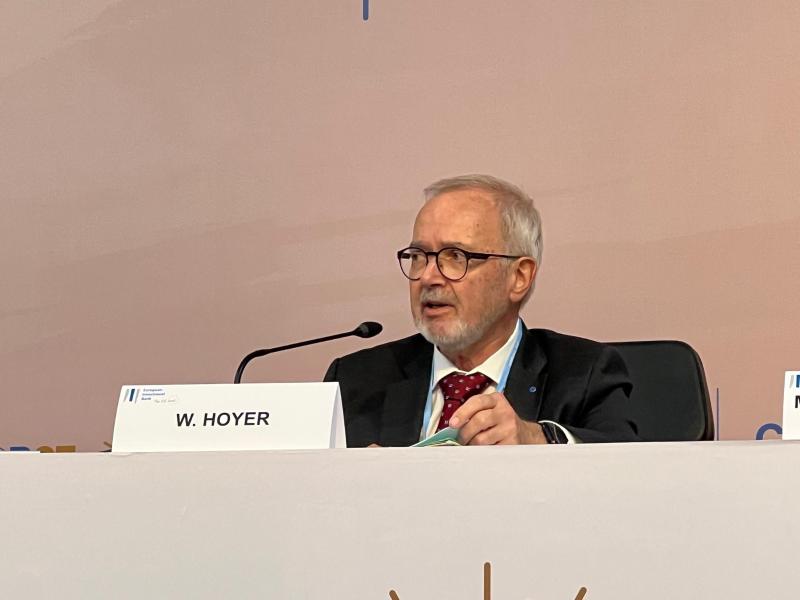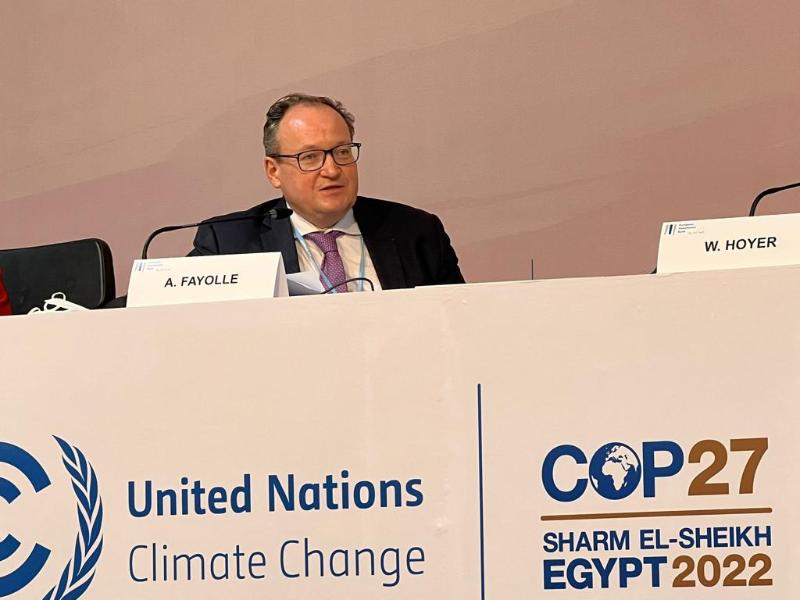EIB President Werner Hoyer and Vice-President Ambroise Fayolle opened the EIB press conference at COP27 on “Financing a global just transition to climate neutrality”, on 7 November in Sharm El-Sheikh.
Find out more on EIB’s participation at COP27 and read EIB Vice-President Ambroise Fayolle’s speech at the press conference.
Check against delivery.

Ladies and Gentlemen,
Thank you for joining us today at COP27. Let me congratulate the United Nations and the Egyptian COP27 Presidency for their huge commitment and effort in organising this year’s meetings.
The European Investment Bank has worked closely with Egypt to deliver a successful outcome for the COP, globally and domestically.
The EIB has worked with Egypt since 1979. And we will continue our partnership to support the country’s ambitious National Climate Change Strategy 2050, including investments in green energy, sustainable transport and agriculture and clean water.
Later this week, we will announce new projects that will accelerate the country’s green transition and strengthen resilience to climate change impacts.
Crisis is the background to COP. Last year’s COP conference took place during the pandemic.
This year, the backdrop to the conference is the unprovoked Russian invasion of Ukraine, a human tragedy, and the cause of a global energy and food crisis. The war and the resulting crises have increased the risk of a global recession, and we know all too well who will suffer most; the poor, who lack the economic resources to weather the storm.
At the same time, the IPCC issued several dire warnings that the window in which we can limit global warming and adapt to the impact of climate change is rapidly closing.
Let’s be clear: We cannot hide behind the pandemic, or the war in Ukraine, or any other crisis, when it comes to the fight against climate change. There is no alternative to dedicated climate action.
The IPCC also tells us that we still have options to meet our emissions reduction targets and to make our infrastructure more climate resilient.
But we must start acting now, today, here at COP27, where the motto is: together for implementation!
The EIB is determined to do its part. In 2021, the EIB delivered a record amount of green finance of €27.4 billion globally, more than 50% of our total activity. This includes investment in floating wind farms in Europe, solar energy in Africa, clean transport in Asia and climate adaptation in Latin America.
I can already indicate today:
- that we are confident we will reach similar levels of green financing again in 2022, and
- we will be announcing a number of projects here at COP in the next two weeks.
Ladies and Gentlemen,
The current energy crisis is not only a European crisis. The International Energy Agency called it the first global energy crisis in history.
This crisis shows that climate action, in particular the decarbonisation of our energy systems, has become a prerequisite, not just for saving the planet from climate catastrophe, but also to maintain energy security and to safeguard economic growth.
This is why our response to the energy and climate crises must focus on investing in renewables, energy efficiency, power networks and energy storage, but also in innovative technologies that will help to decarbonize hard-to-abate sectors, such as heavy industry, shipping and aviation.
I therefore call on COP27 participants to put at the centre of our discussions innovative partnerships to finance green technologies. The EIB is determined to work with all our partners and step up our financing for the green solutions of the future.
Two weeks ago, our Board of Directors agreed €30 billion of additional clean energy investment over the next five years to support the European Commission’s REPowerEU plan. This extraordinary initiative will help the EU to escape the shackles of fossil-fuel dependency, to meet its climate goals and to contribute to the decarbonisation of the global economy.
It is, of course, daunting to try to scale up climate finance now. The economic downturn imposes budgetary constraints. That is particularly true of the Global South, where public coffers are simply not deep enough.
Development banks can play a key role in this collective endeavour, de-risking investments and crowding in contributions from the private sector.
In 2020, Multilateral Development Banks committed US$66 billion for climate action, over half of which was channelled to developing countries.
Then in 2021 alone, MDBs stepped up and committed US$82 billion to climate financing. Again, more than half went to developing countries.
Total 2021 financing surpassed the 2025 climate finance goals set by MDBs at the 2019 UN Secretary General’s Climate Action Summit in New York.
The EIB is chairing the group of MDBs this year. Yesterday we published a joint statement on our shared ambition for climate action.
MDBs have shown in the past that they can deliver impact fast and at scale. Our collaboration – from strategic discussions to project-level technical cooperation – adds value to the work of each of our institutions.
The situation is serious. Global efforts still fall short. But I am optimistic. I see many successes. They are sometimes small, but they are important steps along the long road we all face.
They make me hopeful that, in the end, the global community will live up to the challenge. We, at the European Investment Bank, are doing our part in this journey.
I now hand over to Vice-President Ambroise Fayolle to present two EIB announcements.

Thank you.
Climate action and the transition to low-carbon, more resilient societies must be inclusive. To tackle increasing global average temperatures and rising inequalities, there is an urgent need to accelerate socially inclusive and gender-smart climate finance, and to support a Just Transition for all. It’s simple: the transition will be just, or there will be no transition.
The first announcement that the EIB will make during this COP is on supporting a just transition globally. We will publish a statement in which we pledge to expand our range of financing tools for projects aimed at supporting a just transition to a climate-neutral economy across the world. Moreover, the EIB will support adaptation actions that explicitly address the needs of areas and populations most vulnerable to the negative impacts of climate change. This is called “just resilience”.
As an example, in São Tomé and Príncipe – a small island developing state particularly vulnerable to the negative impacts of climate change – EIB Global is looking into providing technical support for developing a connection strategy and subsidy mechanism to ensure access to drinking water for vulnerable households and for women.
At COP27, we also must continue to create momentum for gender-smart climate finance. Last year, in Glasgow, we launched the “2X Gender-Smart Climate Finance Guide” to identify gender and climate investment opportunities and provide tools, analysis and case studies for investors. Now, here in Sharm El-Sheikh, we are calling on our partners to join us in this important endeavour.
Ladies and Gentlemen,
We are here at the climate COP, but in a couple of weeks the ‘Nature’ COP15 will open in Montreal. Fighting climate change, protecting nature, and halting biodiversity loss are very much interrelated. This is why we are launching – and this is our second announcement – a new EIB Environment Framework.
As part of its climate and environment objectives, the EIB will support operations that help reduce pollution and protect health and human well-being. We will finance projects that promote the sustainable use and protection of water resources. And we will support operations that encourage the development of a blue economy for marine and coastal resources. The EIB will also help speed up the shift towards a more circular economy and increase its contribution to reversing global biodiversity loss and ecosystem degradation.
To give a concrete example, tomorrow morning, the EIB—together with the European Commission, the European Bank for Reconstruction and Development and the Union for the Mediterranean—will announce the launch of the new Blue Economy Mediterranean Partnership. The Blue Med Partnership, as we call it, aims to scale up sustainable blue economy investment in the European Union’s Southern Neighbourhood, to help improve the environmental status of the Mediterranean basin and, at the same time, to tap into the economic opportunities that the Blue Economy has to offer.
Ladies and Gentlemen,
This is Africa’s COP. We recently established EIB Global to reinforce our efforts outside the EU, but our partnership with African countries dates back more than 55 years. EIB financing aims to help secure access to clean and affordable energy for hundreds of millions of people in Africa.
Through EIB Global, we are strengthening our presence in Africa and are mobilising private capital at scale for innovative green technologies, such as green hydrogen.
In addition, in line with our commitment to triple our adaptation finance by 2025, we are keen to contribute to the “Africa Adaptation Acceleration Programme”. This programme, launched by the African Development Bank, will mobilize US$25 billion for climate change adaptation on the African continent.
Let me conclude by saying that there has been tangible progress since the Paris Agreement was adopted in 2015. But we are not yet on track to ‘net-zero’. More ambition is urgently needed, and we must avoid backtracking on existing commitments.
The EIB is keen to work with partners from across the world to increase financing that accelerates the green and just transition of our economies, helps communities adapt to the negative impacts of climate change, protects nature and halts biodiversity loss.
Thank you.